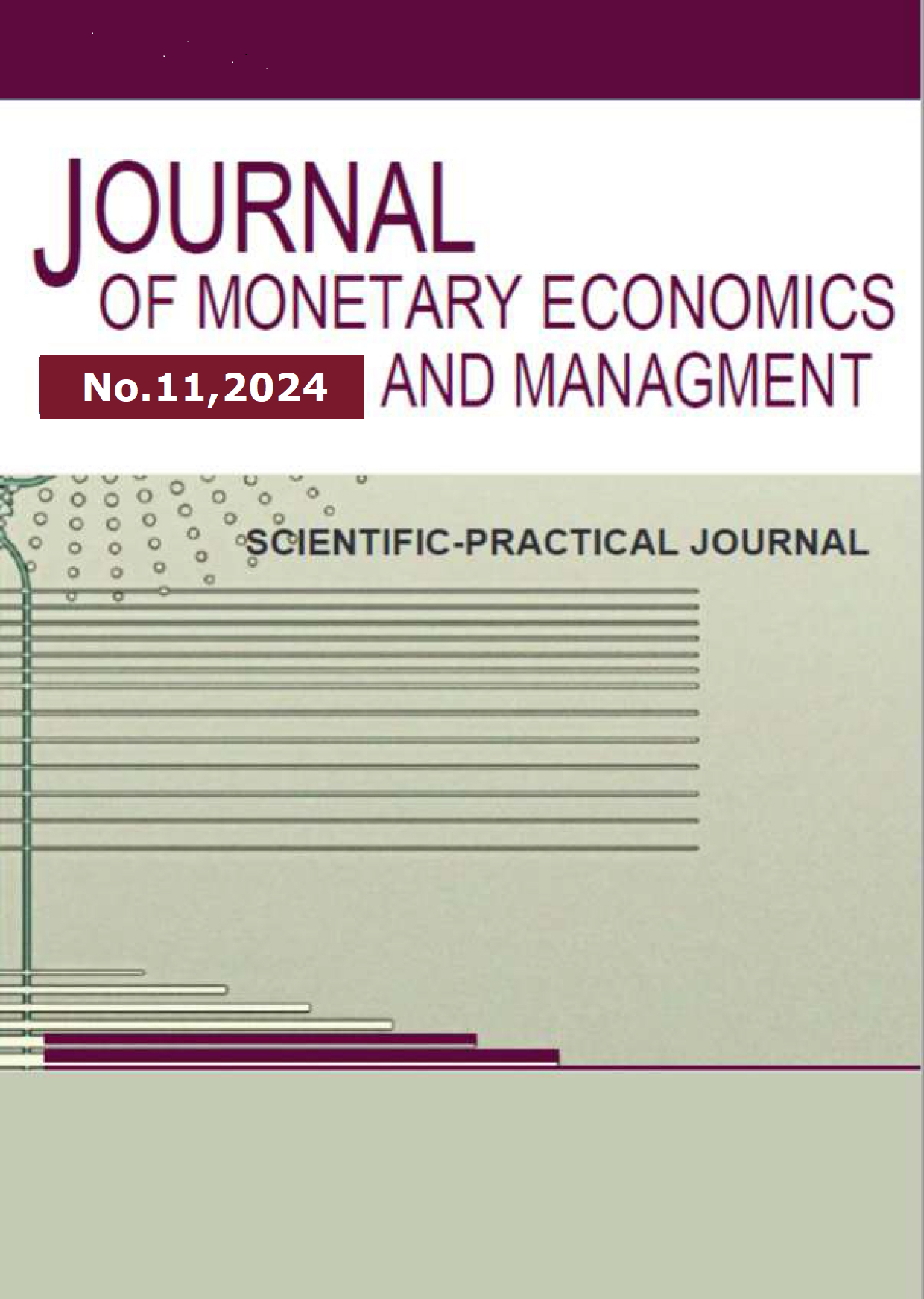student
student
student
The life of every person not only in the Russian Federation, but also in other countries, since the beginning of the twenty-first century, has rapidly developed towards digitalization. Humanity is on the way to the transition to the digital era. All spheres of life and activity have moved to the digital world, which has resulted in significant changes in society, specifically in economic development. Thus, the world's largest companies, after using digital technologies, have become more resilient and stable to the challenges of the surrounding world and other uncertainties. The authors provided the results of a study related to the development of the relationship between the economy, information and telecommunication technologies and processes related to the digital transformation of Russia. The main method used by the authors is the collection and analysis of materials, statistics and research literature, as well as the latest technologies used in the Russian Federation and beyond. They came to the conclusion that computerization acts as a physical and technological basis for the development of the digital economy. In turn, informatization connects computerization with digitalization. Digitalization itself, today, is only being formed.
: economics, people in the economy, digitalization, digital economy
1. Vatolina O. V. K voprosu o cifrovoy transformacii ekonomiki / O. V. Vatolina, D. V. Kolodin // Vestnik Tihookeanskogo gosudarstvennogo universiteta. – 2024. – № 1(72). – S. 97-106. – EDN UEBNTU.
2. Razvitie cifrovoy ekonomiki v Rossii kak klyuchevoy faktor ekonomicheskogo rosta i povysheniya kachestva zhizni naseleniya / Andreeva G. N., Badal'yanc S. V., Bogatyreva T. G. i dr. N. Novgorod : Prof. nauka, 2018. 98 s.
3. Baranov D. N. Suschnost' i soderzhanie kategorii «Cifrovaya ekonomika» // Vestnik Moskovskogo universiteta imeni S. Yu. Vitte. Ser. 1: Ekonomika i upravlenie. 2018. № 2. S. 15-23.
4. Bondarenko V. M. Mirovozzrencheskiy podhod k formirovaniyu, razvitiyu i realizacii «cifrovoy ekonomiki» // Sovremennye informacionnye tehnologii i IT- obrazovanie. 2017. T. 13, № 1. S. 237-251
5. Voroncovskiy A. V. Cifrovizaciya ekonomiki i ee vliyanie na ekonomicheskoe razvitie i obschestvennoe blagosostoyanie // Vestnik Sankt-Peterburgskogo universiteta. 2020. T. 36, vyp. 2. S. 189-216.
6. Gorlov K. N. Social'noe neravenstvo v usloviyah cifrovoy ekonomiki // Social'no-politicheskie nauki. 2021. № 1.
7. Gretchenko A. A. Suschnost' cifrovoy ekonomiki, genezis ponyatiya «Cifrovaya ekonomika» i predposylki ee formirovaniya v Rossii // Nauchno-analiticheskiy zhurnal nauka i praktika Rossiyskogo ekonomicheskogo universiteta im. G. V. Plehanova. 2018. № 3. S. 23-37.
8. Grum-Grzhimaylo Yu. V. Social'no-ekonomicheskie aspekty informacionnogo obschestva ekonomika informacionnogo obschestva: illyuzii i real'nost' // Informacionnoe obschestvo. 2010. № 6. S. 12-27.
9. Zubarev A. E. Cifrovaya ekonomika kak forma proyavleniya zakonomernostey razvitiya novoy ekonomiki // Vestnik TOGU. Habarovsk, 2017. № 4. S. 177-184.
10. 10 Indikatory cifrovoy ekonomiki: 2022 : stat. sb. / G. I. Abdrahmanova, S. A. Vasil'kovskiy, K. O. Vishnevskiy i dr. M. : NIU VShE, 2023. 332 s.
11. Interaktivnaya statistika i intellektual'naya analitika sbalansirovannosti regional'noy ekonomiki Rossii na osnove Bol'shih dannyh i blokcheyn – 2020 / In-t nauchnyh kommunikaciy. URL : https://www.datasets-isc.ru/data2/data-set-po-regionalnoj-ekonomike-rossii (data obrascheniya: 11.01.2024).
12. Kalinkina N. N. Kontury formirovaniya informacionnogo obschestva v Rossii. Informatizaciya obschestva i razvitie informacionnoy infrastruktury // Vestnik Nizhegorodskogo universiteta im. N. I. Lobachevskogo. 2010. № 3. S. 494–499. URL: https://www.elibrary.ru/download/elibrary_15571561_18041665.pdf (data obrascheniya: 11.01.2024).
13. Korovin G. B. Sravnitel'naya ocenka cifrovizacii industrial'nyh regionov RF // Ekonomika regiona. 2023. № 1.
14. Kryukova A. A., Mihalenko Yu. A. Instrumenty cifrovoy ekonomiki // KNZh. 2017. № 3.
15. Lonskiy I. I. Informatizaciya i evolyuciya obschestva // PNiO. 2015. № 2
16. Naumova T.V., Pereslegin A.G. Riski social'noy stratifikacii v usloviyah cifrovizacii obschestva // Social'no-gumanitarnye znaniya. 2022. № 6.
17. Programma «Cifrovaya ekonomika Rossiyskoy Federacii». URL:http://static.government.ru/media/files/9gFM4FHj4PsB79I5v7yLVuPgu4bvR7M0.pdf (data obrascheniya: 11.01.2024).
18. Razvitie cifrovoy ekonomiki v Rossii: programma do 2035 goda. URL : http://spkurdyumov.ru/uploads/2017/05/strategy.pdf (data obrascheniya: 11.01.2024).
19. Suhov A. V., Streha A. A. Setevaya struktura kak osnovopolagayuschee svoystvo organizacii informacionnyh processov v sovremennom informacionnom obschestve // Transportnoe delo Rossii. 2012. № 6-2. S. 154-156.
20. Tolkachev S. A. Kiberfizicheskie komponenty povysheniya konkurentosposob- nosti obrabatyvayuschih otrasley promyshlennosti // Ekonomicheskoe vozrozhdenie Rossii. 2019. № 3. URL: https://cyberleninka.ru/article/n/kiberfizicheskie-komponenty- povysheniya-konkurentosposobnosti-obrabatyvayuschih-otrasley-promyshlennosti (data ob- rascheniya: 28.01.2024).
21. Yudina T. N. Osmyslenie cifrovoy ekonomiki // Teoreticheskaya ekonomika. 2016. № 3. S. 12-16.
22. Yakutin Yu. V. Rossiyskaya ekonomika: strategiya cifrovoy transformacii (k konstruktivnoy kritike pravitel'stvennoy programmy «Cifrovaya ekonomika Rossiyskoy Federacii») // Menedzhment i biznes-administrirovanie. 2017. № 4. S. 27-52.
23. Yanchenko E. V. Riski bezraboticy v usloviyah cifrovizacii ekonomiki // Eko- nomika truda. 2020. № 8.
24. Implications of Industry 4.0 on industrial employment: A comparative survey from Brazilian, Chinese, and German practitioners / Beier G., Matthess M., Shuttleworth L., Guan T., Grudzien D., Xue B., Chen L. // Technology in Society, 70. DOI:https://doi.org/10.1016/j.tech- soc.2022.102028.
25. Chanias S., Myers M. D., Hess T. Digital transformation strategy making in predigital organizations: The case of a financial services provider // The Journal of Strategic Information Systems. 28(1). 17-33. DOI:https://doi.org/10.1016/j. jsis.2018.11.003.
26. Industry 4.0 applications for sustainable manufacturing: A systematic literature review and a roadmap to sustainable development / Ching N. T., Ghobakhloo M., Iranmanesh M., Maroufkhani P., Asadi Sh. // Journal of Cleaner Production. 334. 130133. DOI:https://doi.org/10.1016/j.jcle- pro.2021.130133.
27. Erikstad S. O. Merging Physics, Big Data Analytics and Simulation for the Next-Gen- eration Digital Twins // HIPER’17: 11th Symposium on High-Performance Marine Vehicles. Zevenwacht, Technical University Hamburg. pp. 140-150.
28. Klingenberg C. O., Borge, M. A. V., Vale Antune, J. A. Industry 4.0: What makes it a revolution? A historical framework to understand the phenomenon // Technology in Society, 70. DOI:https://doi.org/10.1016/j.techsoc.2022.102009.
29. Digital transformation and customer value creation in Made in Italy SMEs: A dynamic capabilities perspective / Matarazzo M., Penco L., Profumo G., Quaglia R. // Journal of Busi- ness Research, 123, 642-656. DOI:https://doi.org/10.1016/j. jbusres.2020.10.033.
30. Negroponte N. Being Digital. NY : Knopf, 1995. 256 p.
31. Industry 4.0 and supply chain performance: A systematic literature review of the ben- efits, challenges, and critical success factors of 11 core technologies / Rad F., Oghazi P., Palmié M., Chirumalla K., Pashkevich N., Patel P. C., Sattari, S. // Industrial Marketing Management. 2022. 105. 268-293. DOI:https://doi.org/10.1016/j.indmarman.2022.06.009.
32. Katz R. Social and economic impact of digital transformation on the economy. ITU, GSR-17 Discussion paper. 2017.
33. A systematic literature review for digital business ecosystems in the manufacturing industry: Prerequisites, challenges, and benefits / Suuronen S., Ukko J., Eskola R., Semken R. S., Rantanen H. // CIRP Journal of Manufacturing Science and Technology, 37, 414-426. DOI:https://doi.org/10.1016/j.cirpj.2022.02.016.
34. Vitevskaya O. V., Kvachahiya I.Z. Cifrovaya ekonomika v Rossiyskoy Federacii//Aktual'nye voprosy sovremennoy ekonomiki. 2023.- №3. S.245-249









